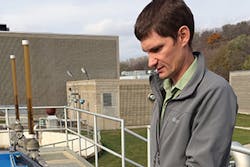Minnesota is nicknamed “The Land of 10,000 Lakes” (actually there are 11,842). “We are a pretty water-rich state here in Minnesota,” notes Travis Block, public works director for Faribault, Minnesota. “Water resources are a very important part of our economy, our recreation, and our quality of life.”
Every once in a while, a weather event such as flooding comes along with the potential to negatively impact the area’s water resources. Block works hard to ensure that Faribault’s citizens receive water and wastewater services in as seamless a fashion as possible. For the water division, that means providing potable water through four storage tanks, two pumping stations, five production wells, and other equipment.
The town’s water reclamation services include a state-certified analytical laboratory, land application of approximately 4 million gallons of biosolids annually, and an industrial monitoring and pretreatment program. Some 3.5 to 4 million gallons of municipal and industrial wastewater are treated daily.
What He Does Day to Day
In larger municipal settings, there is usually one person in charge of a water, wastewater, or stormwater department. Faribault has a population of 23,000, so that means Block is not only in charge of the water-related utilities, but also street maintenance, snow and ice control, right-of-way management, and the municipal airport. Block thus spends his days engaged in administrative tasks related to those disciplines such as budgetary development, oversight, and state and federal regulatory compliance.
He also spends his days problem-solving and trouble-shooting. He oversees 30 full-time employees and one-part time employee in the work of operating, maintaining, and improving the delivery of the town’s services and its infrastructure.
What Led Him to This Line of Work
The seeds for working in an environmental job were planted early in Block’s life. “I’m a big outdoors guy. I love to hunt, fish, camp, go snowboarding; I’m very outdoors-oriented and my upbringing was that way.”
Environmental science was starting to grow in popularity as Block went through high school, so he figured it would be a good path to pursue in college. “It’s kind of ironic, because science was not my strongest academic area in high school,” he says.
During fall semesters, hunting took priority over academics, so Block had to learn to adjust his priorities. Block would go on to earn a B.S. in environmental science in 1996 and a Master’s in Public Administration in 2010 from Minnesota State University.
He quickly rose through the ranks of Faribault Public Works, starting as a wastewater operator in 1998, moving into a lab tech job, and then taking a position as a wastewater foreperson for 11 years before taking the position of public works director more than three years ago. He’d only been with the Faribault DPW for a year when his exemplary work earned him a “Rookie of the Year” service award from the Minnesota Wastewater Operators Association.
“I found it really interesting,” he says of working the various positions in Faribault’s public works department. “It was a wide variety of things to do and I felt I could have the most impact on the community. I’ve got my hands in quite a few things, so I can play a part in shaping those departments, making them better, and providing good-quality service to the residents.”
What He Likes Most About His Job
“I like the interaction with the community, with the residents,” says Block. “It’s being able to make a difference at the end of the day; when we discharge the water that is going into the receiving water, that I had a part in making as clean as possible, and just having a positive impact on the community.”
“It’s important for any infrastructure-related or utility public entity to make sure that you’re going forward meeting the needs of the community with the resources available,” says Block. “I try to strike that balance in making sure everything is as efficient as possible and, at the same time, looking at everything that needs to be improved going forward. Trying to balance that out is a challenge for all utilities and public service in general.”

